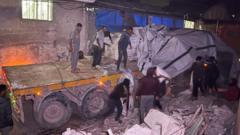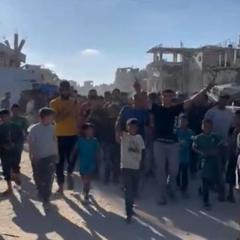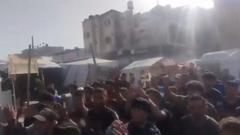Over 90 truckloads of aid have begun arriving in Gaza, marking a crucial moment amid ongoing humanitarian challenges following a two-month blockade.
Aid Deliveries Commence in Gaza After Prolonged Blockade

Aid Deliveries Commence in Gaza After Prolonged Blockade
Significant food supplies reach the Gaza Strip as humanitarian crisis deepens.
In a pivotal development, approximately 90 truckloads of humanitarian aid entered Gaza on Thursday, according to the United Nations, representing the first significant supply influx after a two-month blockade imposed by Israel. The blockade intensified the humanitarian crisis in the region, severely limiting access to food and essentials for the population.
Both the U.N. humanitarian affairs office and Israeli military officials confirmed that aid is being delivered to warehouses and other designated locations in Gaza after an extended period of delays. Despite this progress, aid organizations have emphasized that the current shipments are merely a fraction of what is urgently needed. The World Food Program, a key agency in Gaza, expressed concerns via social media: "Desperately needed aid is finally trickling in — but the pace is far too slow. We need more aid trucks coming in daily."
The heightened humanitarian crisis in Gaza stems from Israel's decision to ban the entry of food and fuel for two months, citing security concerns related to the Palestinian militant group Hamas. Israeli officials claimed that Hamas diverted humanitarian aid for its own gain, although these assertions are contested by various international aid organizations.
Israel's agreement to allow limited aid was tied to conditions set forth by the government, including a requirement for U.N. approval of a new mechanism for relief distribution. However, the U.N. and numerous aid groups rejected these stipulations, highlighting concerns that such changes would undermine their operational integrity.
After facing mounting international pressure, Israel announced it would permit U.N. agencies to supply small quantities of food into Gaza under a previous system. Nonetheless, negotiations between Israeli authorities and the United Nations prolonged the arrival of aid. The U.N. Office for the Coordination of Humanitarian Affairs (OCHA) stated that Israeli mandates required aid trucks to navigate a precarious route through Gaza, leading to fears of potential looting.
The Israeli military's coordinating agency, COGAT, did not respond to inquiries regarding the situation. Israeli officials have indicated a desire to implement a new aid distribution framework to bypass U.N. involvement in the near future.
In a recent televised address, Israeli Prime Minister Benjamin Netanyahu reiterated a commitment to intensifying military operations against Hamas unless the group agreed to cease-fire terms outlined by the government. He mentioned plans for relocating Palestinians to a designated "sterile zone" in southern Gaza, which would be free from Hamas control, while promising the provision of humanitarian assistance. Netanyahu affirmed that the ultimate goal is to ensure Gaza is entirely under Israeli security control, with Hamas effectively dismantled.
As the situation continues to evolve, many remain hopeful that increased humanitarian efforts can help alleviate the suffering faced by Gazans amidst a tumultuous context.





















